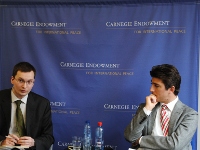Registration
You will receive an email confirming your registration.
IMGXYZ2391IMGZYXA failure of the international coalition in Afghanistan would jeopardize Russian interests in the region, and do nothing to stem the flow of narcotics from Afghanistan to Russia. Moscow is already committed to helping the coalition in its struggle against the Taliban insurgency. It has agreed to the transport of NATO materials through Russian territory and provided assistance to the coalition, supplying helicopters and training for Afghan security forces.
In spite of this assistance, there is a growing feeling in the West that Russia could be playing a more decisive role in Afghanistan. Meanwhile, Russians feel that their interests are being marginalized and, in particular, that more should be done to combat Afghan narcotics production.
In an event hosted by Carnegie Europe, Carnegie Moscow’s Peter Topychkanov talked about Russian policy towards Afghanistan and towards the international coalition in Afghanistan.
Political support
President Medvedev has officially expressed his support for the presence of international and American forces in Afghanistan. However, Topychkanov explained the Kremlin still views American activities in Afghanistan with a degree of suspicion, as the authorities do not fully understand their scope, and it quietly applauded President Obama’s decision to set a timeline for the withdrawal of U.S. troops.
Talking to the Taliban
The Russian government does not draw a distinction between so-called ‘moderate’ and ‘hard-line’ elements of the Taliban, Topychkanov explained. As a result, Russia does not believe in the idea of a political solution based on engaging with the Taliban.
Russia’s contribution to the stabilization effort
- Training: Russia has provided training for drugs officers and has encouraged cooperation between its anti-drugs squads and Afghanistan. It also provided technical support to Afghan security forces, to aid in their fight against drug trafficking.
- Technical Support: Russia has provided technical support to the Afghan National Army and security forces, as well as offered officer training.
- Development Assistance: Russia is making significant contributions to development assistance in Afghanistan, primarily by forgiving some of Afghanistan’s debt to the former Soviet Union. It is also providing a degree of support to other development projects, such as the construction of schools and a national power grid.
Unlike China and India, Russia is wary of developing closer business ties with Afghanistan, Topychkanov explained, citing security concerns as the Kremlin’s chief concern. The first of the Russian investments, a helicopter company, which already operates in Afghanistan, does not have the benefit of support coming from the United States or NATO. He also suggested that there is concern in Russia about the extent to which Afghans still see Russia as a former occupying power, and therefore that a stronger Russian presence might not be welcome in Afghanistan.
Three Policies for Afghanistan
Topychkanov suggested that Russia will adopt one of three policies regarding Afghanistan, depending on its perceived needs and its relations with NATO and the United States. These potential policies were influenced by what Topychkanov described as the “Afghan syndrome,” which results from the trauma of the Soviet Union’s abortive occupation of Afghanistan.
- Non-interference: Russia is currently following a policy of non-interference. This is linked to Russian concerns about NATO and U.S. activities in Afghanistan and Pakistan. Topychkanov suggested that, for Russia to change its policy of non-interference, the United States and NATO would have to make their activities more transparent to the Russian authorities.
- Realpolitik: Russia does not have the resources to significantly increase its engagement in Afghanistan. A realpolitik policy would recognize this deficiency and seek primarily to mitigate any potentially negative fallout from Afghanistan. Topychkanov suggested that the central tenet of such a policy would be establishing close ties with the northern provinces of Afghanistan, therefore creating a buffer zone made up of Tajik, Uzbek, and other Northern Caucasus minorities. If Afghanistan were to completely fall apart, Russia could thus envisage the country partitioned into two parts: a safe, Russia-friendly north and a south, inhabited by the Pashtuns, Taliban, and their allies.
- A United Afghanistan: The creation of a united, strong, and centralized Afghan state would require accepting certain elements of the Taliban into the government, as well as the demilitarization of vast stretches of Afghanistan. This approach is based on a U.S. initiative, and Russian authorities seem to look on it favorably, Topychkanov said. This policy holds particular appeal for Russia, as it would allow them to participate in the reconstruction of Soviet built facilities in Afghanistan and regain importance in the region. Russia presented a proposal based on this policy approach during the London conference in January.
War on drugs
Drug production in and trafficking from Afghanistan is seen as the most important policy concern for Russian officials, explained Topychkanov. With more than 2 million illegal drug users, Russia is the biggest consumer of drugs originating from the region. Each year, 30,000 or 40,000 people die of drug-related causes in Russia. Increased production of drugs in Afghanistan is thus cause for serious alarm.
Regional cooperation
Topychkanov acknowledged that better international and regional cooperation is necessary in order to stabilize the situation in Afghanistan. However, he continued, the strong animosities between the countries who would need to be involved make such cooperation seems virtually impossible. The United States does not want to sit at the negotiating table with Iran. Russia has strained relations with both Iran and Pakistan, and Pakistan has deep concerns about India’s involvement in Afghanistan. It seems unlikely that any international talks could overcome such significant barriers.
